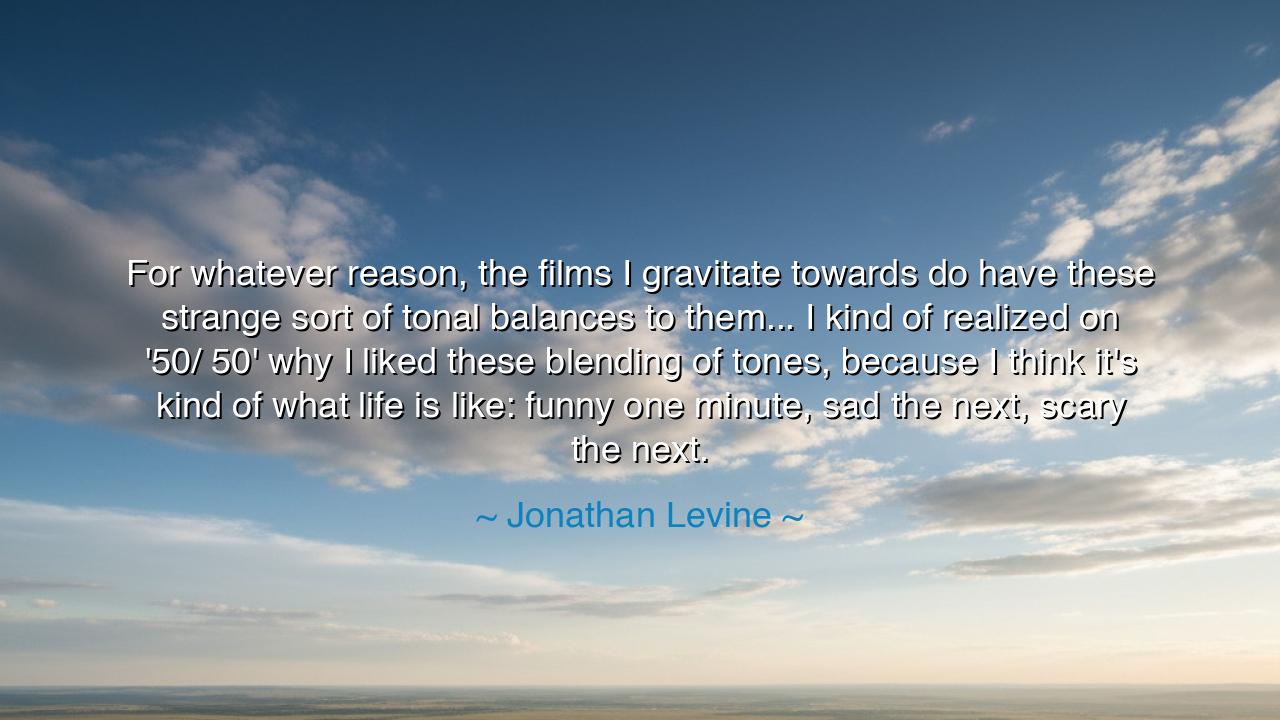
For whatever reason, the films I gravitate towards do have these
For whatever reason, the films I gravitate towards do have these strange sort of tonal balances to them... I kind of realized on '50/ 50' why I liked these blending of tones, because I think it's kind of what life is like: funny one minute, sad the next, scary the next.






Hear the reflection of Jonathan Levine, a craftsman of stories and seeker of truth: “For whatever reason, the films I gravitate towards do have these strange sort of tonal balances to them… I kind of realized on 50/50 why I liked these blending of tones, because I think it’s kind of what life is like: funny one minute, sad the next, scary the next.” Though spoken of cinema, these words unveil a deeper philosophy—that life is not one note, nor one color, nor one endless mood, but a shifting tapestry, woven of laughter, grief, and fear.
The ancients, though they knew nothing of films, understood this truth in their myths. Homer sang of Achilles, whose rage on the battlefield turned swiftly to mourning at the death of Patroclus. The same voice that shouted in fury cried out in anguish, for the human heart moves between extremes like a ship tossed on waves. Levine’s vision of the blending of tones mirrors the very fabric of these epics, where triumph was mingled with tragedy, and joy with dread. The wisdom is clear: to portray life truly, one must not divide it into neat compartments, but show it in all its contradictions.
Consider the real-life tale of Abraham Lincoln during the American Civil War. In the very halls where he bore the unbearable burden of a divided nation, he told jokes to his weary advisors, easing their spirits with humor. Yet in the next moment, he would weep alone over the letters of mothers who had lost their sons. His life, like Levine’s films, was a canvas where funny, sad, and scary lived side by side. This was not confusion—it was humanity.
Levine’s insight is that art, to be true, must embrace this shifting nature. A story that is only tragic becomes heavy and distant; a story that is only comic becomes hollow and shallow. But when the two are mingled, when humor pierces through sorrow, and fear sharpens joy, then the work reflects life as it truly is. 50/50, a tale of cancer and friendship, taught him this lesson: that a single moment can hold both laughter and tears, that the heart is vast enough to contain both dread and delight.
This is why audiences resonate with such tonal balances. For they see themselves in them. The one who buries a loved one knows that amidst grief, someone will say something absurd, and for a brief moment, the mourner will laugh through tears. The one who falls in love knows that joy is often tinged with fear, for what is precious can be lost. These shifts are not contradictions; they are the essence of human existence.
The lesson for us is this: do not seek to live only in one tone. Do not imagine that life must always be joyful, or always sorrowful, or always secure. Embrace the flux. When joy comes, take it fully; when grief arrives, let it deepen you; when fear visits, let it sharpen your courage. For just as the artist creates meaning through contrast, so does life become richer through its changes. The harmony of existence is not in sameness, but in balance.
Practical action follows: train your heart to accept these shifts without despair. When laughter interrupts sorrow, do not feel guilt; let it heal you. When fear strikes amidst joy, do not let it steal the moment; let it teach you to cherish what you have. And when life feels strange, moving from comedy to tragedy to terror, remember: this is what it means to be alive. Do not resist the movement—flow with it, and you will find wisdom in the rhythm of existence.
Thus Levine’s words, though spoken of films, reveal an ancient truth. Life is not a single note but a symphony, not a single color but a spectrum. To live fully is to accept the comedy, the tragedy, and the terror, and to find beauty in their intertwining. For only then do we honor the whole of our humanity, and only then do we become both students and authors of the great story we are given to live.






AAdministratorAdministrator
Welcome, honored guests. Please leave a comment, we will respond soon